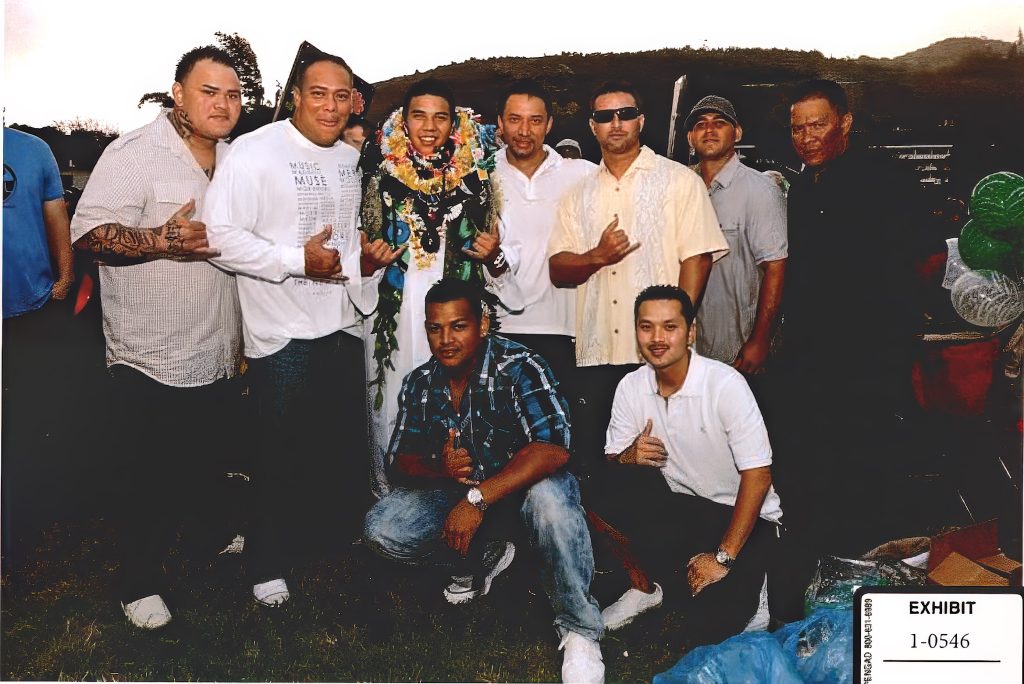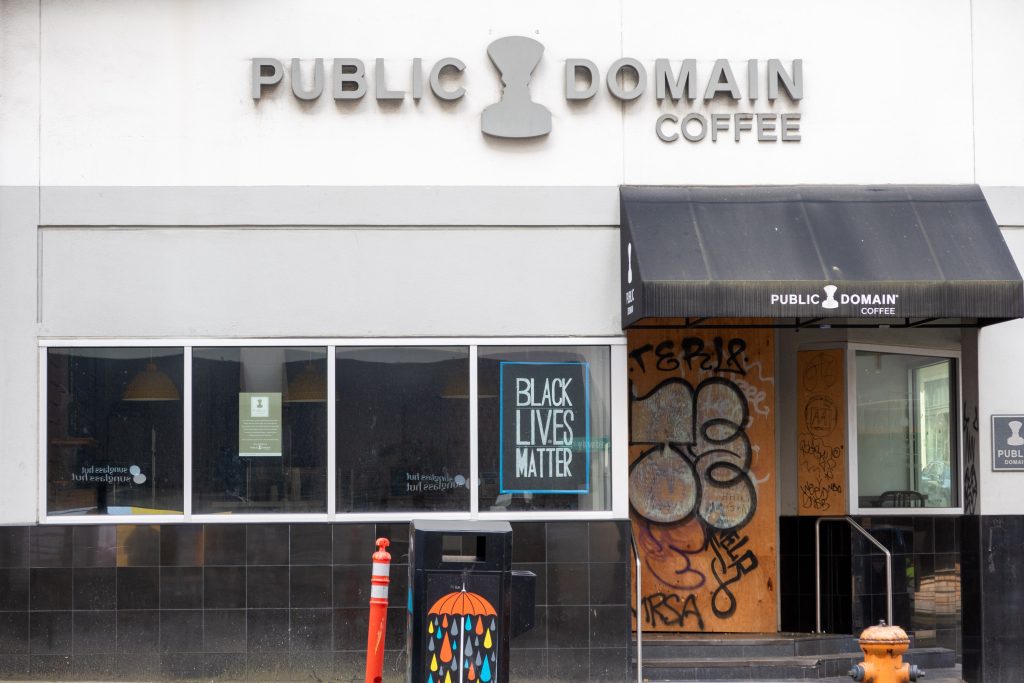This photo was taken at a high school graduation party that Mike Miske put on for his son, Caleb, in 2012.
It was, Miske explained in an email warning an associate not to miss the event, “a very important gathering.”

Caleb Miske’s graduation celebration
Miske, the former owner of Kamaaina Termite and Pest Control, M Nightclub, Kamaaina Plumbing, and several other businesses, was convicted last year on 13 counts of racketeering and related offenses, including murder and conspiracy. Several offenses related to the disappearance of Jonathan Fraser, Caleb’s best friend, carry a minimum sentence of life in prison.
Miske died of what is believed to have been an accidental fentanyl overdose while in custody at Honolulu’s Federal Detention Center last December.
But at the time of Caleb’s graduation in 2012 Miske was riding high. Kamaaina Termite had been paid over $4 million in 2010 to treat cabinets in a number of apartments in the two-year-old Keola Lai condominium near downtown Honolulu. The owner of a competing termite treatment company estimated he would have bid under $1 million for the job, but was told that competing bids were not being accepted.
The job was a windfall for Miske, who used over $1 million of the proceeds to fund the buildout and opening of his M Nightclub, another $150,000 to pay down a loan for the purchase of the land for his luxury home at Portlock, and over $900,000 to purchase the Longline fishing vessel “Rachel,” which the government suspected was used to transport drugs as well as engage in legitimate fishing operations, according to financial records cited in the government’s pending civil forfeiture lawsuit.
And Miske must have been feeling good because after four years as the focus of an FBI investigation dubbed “Waimanalo Blues,” named after Miske’s home neighborhood, he had avoided any charges.
The photo from Caleb’s graduation celebration gathered some of his inner circle of associates.
Those in the photo, from left to right when viewing the picture, Back Row: John Stancil, Andrew “Drew” Kim, Caleb Miske (wearing the lei), Mike Miske, Josiah Akau, Russel Mascoto, Alfred “Fredo” Cabael; Kneeling in front, Hansen Apo and Jason Yokoyama.
For perspective, Miske was 6-1 and about 210 pounds.
Here’s a quick review.
John Stancil. Mike Miske’s younger half-brother, who he brought into his organization with a combination of rewards, taunts, and threats. Stancil was convicted of racketeering conspiracy and is serving a 20-year sentence in federal prison, the maximum for this crime.
Andrew Kim. Provided “muscle” to Miske. During Miske’s trial, Kim was identified as the primary attacker in the severe beating of a bartender at Miske’s nightclub who was suspected of skimming money. The attack at Sand Island eventually led to the victim losing an eye.
He had been charged with felony assault in a 20098 incident at The Shack in Waikiki.
According to the statement of an HPD detective:
KIM walk up to a male and punch the male in the face using his right fist. The male immediately dropped to the ground and appeared motionless. KIM then stood over the motionless male and appeared to throw two (2) more punches toward the male’s upper body. A heavy set male steps between KIM and the defenseless male. KIM appears to walk away, but quickly returns. The male victim appears helpless and incoherent. The male victim attempts to get up but is unable to do so.
KIM then walks up to the defenseless male victim and punches him three (3) more times in the face and kicks him with a soccer style kick to his face.
Caleb Miske. After graduation, Mike Miske registered a termite treatment company with Caleb as the sole officer, but the company was never actually in business. Later, Miske arranged for a job on the docks for Caleb, but evidence at trial indicated Caleb began missing work, drawing Miske’s ire. Caleb died in March 2016 as the result of complications from a high-speed crash in Kaneohe several months previously.
Mike Miske. No introduction needed.
Josiah Akau. One of Miske’s cousins who worked as a Honolulu firefighter. His name appears in state business records as the alternate Principal Managing Employee (RME) for Kamaaina Plumbing. However, Akau was reportedly unaware that he was listed as RME.
According to prosecutors:
Akau never worked as an employee for, nor ever received pay from, Kamaaina Plumbing. Akau was not aware of a document submitted to the DCCA designating him as Kamaaina Plumbing’s RME. Akau was a full-time firefighter, and he held an active contracting license and was listed since June 6, 2011 as the Principal RME for Diversified Contractor Services LLC. Akau had no affiliation with Kamaaina Plumbing and in no way acted as its RME, but MISKE nonetheless arranged to have Akau designated as Kamaaina Plumbing’s RME.
Russel “Russel Boy” Mascoto. Mascoto was among the associates Miske relied on for “muscle,” according to multiple informants cited in investigative files in the Miske case. Phone records presented during the trial show Mascoto had frequent contact with several “burner” cell phones used by Miske. Mascoto was charged in September 2000 with possession with intent to distribute a controlled substance.
According to court records:
On September 7, 2000, Defendant Russell Mascoto was arrested after a search of his home uncovered a backpack containing plastic bags, $2,400.00 in U.S. currency, a stun gun, over fifty grams of methamphetamine, and a firearm with a loaded magazine.
While he was in custody, he was again charged with possession with intent to distribute crystal meth in January 2022. He had also been arrested for criminal property damage, assault, cruelty to animals and motor vehicle theft.
During the Miske trial, Mascoto was identified as the person who staged a break-in at the Waikele storage bunker and theft of fireworks that prevented investigators pursuing further evidence of illegal fireworks sales by a Miske-related company.
Mascoto was also employed on the docks in Honolulu, like Caleb Miske and several others.
He is one of three trustees of the Michael J. Miske Revocable Living Trust.
Alfredo “Fredo” Cabael. According to trial testimony, during one period Cabael was Miske’s “right-hand man,” who did whatever needed to be done for Miske’s businesses. He was described as part of Miske’s trusted inner circle who enjoyed perks like free food and drinks at the M Nightclub.
Cabael worked as a manager and foreman for Kamaaina Termite, where he supervised fumigation crews.
He was one of those who delivered cash payments to those working on construction of Miske’s Portlock, and kept meticulous records. One of his notebooks that recorded payment information was introduced as evidence in Miske’s trial.
Hansen Apo. In May 2006, Mike Miske got in a confrontation with a high school student at St. Louis School. Later in the day, Apo assaulted another young man after Apo and Miske traced the student to a family home in Kalihi. This shows that Apo was one of those providing “muscle” to Miske at least by that time.
In 2013, Apo was convicted of several felonies and sentenced to prison. John Stancil then introduced Miske to Jake Smith, who then began accepting payments from Miske for committing assaults at his request.
Apo, then 31, was shot and killed in April 2019 by a Punaluu man who said he believed Apo was on drugs and coming to rob him. The shooter, Ray Sheldon, said he had been afraid of Apo for seven years since Apo allegedly threatened him with a gun after Sheldon returned drugs to a dealer Apo had stolen the drugs from.
Jason Yokoyama. One of Miske’s co-defendants who pleaded guilty to wire fraud for his role in skimming cash from the bars at Miske’s M Nightclub and delivering the cash to Miske as part of a scheme to avoid taxes. Yokoyama, who “fronted” for Miske in several businesses, was a key player in a series of long-running licensing frauds that allowed Miske to control his businesses but remain largely “off the books.”



